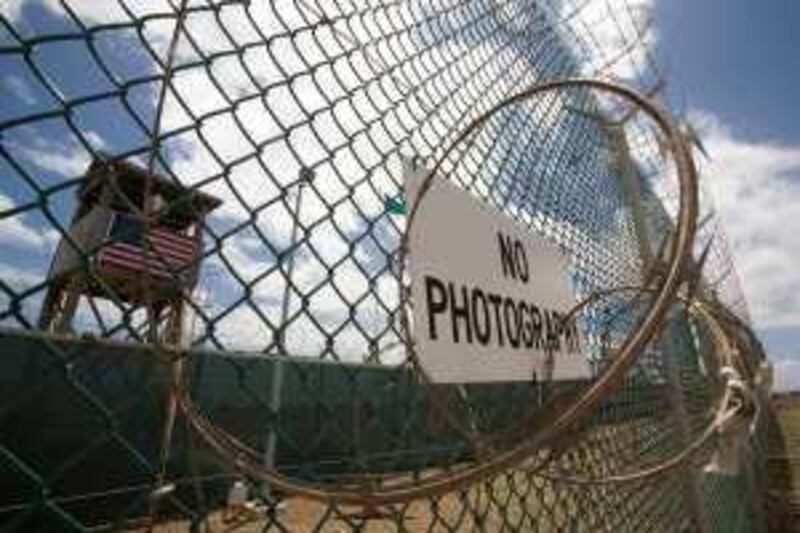KUWAIT CITY // A US federal judge's rejection of a Kuwaiti detainee's petition for release from the US prison in Cuba is another setback for the country's four remaining prisoners there. They have been charged with providing material support for terrorism and conspiracy to assist al Qa'eda and the Taliban and held as "enemy combatants". The US District Judge Colleen Kollar-Kotelly said in a decision made on August 24 but made public on Monday, that the evidence suggests that Fawzi al Odah became a part of the Taliban and al Qa'eda forces. The partially redacted 32-page ruling said Mr al Odah, a Kuwait University graduate, mentions his claims that he was in Afghanistan to "teach poor or needy people for two weeks", but says his statements about his activities "lack credibility". The ruling said Mr al Odah remained in the Tora Bora mountains during the battle there before he was captured by border guards in December 2001. He had in his possession an AK-47 rifle. The court did not accept Mr al Odah's claim that the Tora Bora mountains were the "only way to get from Jalalabad to Pakistan". "A review of the evidence demonstrates that he consciously chose to move through Afghanistan at the direction of Taliban officials and to remain in Taliban-controlled territories ? knowing that fighting was likely to occur," the ruling said. Mr al Odah's petition for habeas corpus, which demands that a judge rule on the lawfulness of someone's detention, was filed more than seven years ago, making his one of the longest cases claiming unlawful imprisonment at the US detention centre in Guantanamo Bay. Judges have freed 29 prisoners and denied the release of seven. There are about 229 detainees still at Guantanamo, some of whom have been cleared to be sent home. Another Kuwaiti detainee, Khalid al Mutairi, was ordered to be released in July and a third, Fouad al Rabiah, has a hearing this week. The case of the last remaining detainee, Fayiz al Kandari, is to be heard in mid-September. Mr al Rabiah's lawyer, Navy Lt Cdr Kevin Bogucki, said he was denied clearance for a trip to Kuwait to speak to family members, the media and government officials. "When we travel on official orders, we need this clearance. Their failure to give us country clearance led us to cancelling the trip," he said. "Basically, what they did was ask us to agree that we would not appear in uniform or perform in public advocacy for our client in Kuwait. The state department was trying to characterise these limitations as not mandatory, but as events unfolded, they were demands." Lt Cdr Bogucki, who made a similar trip in May without restrictions, said he wanted to explain to the Kuwaiti people that his client should not be viewed with suspicion when he eventually returns because he is an "innocent man". "It has all been very disappointing. We were hopeful things might change under president Obama," he said. A state department spokesman said: "We understand it is critical for military commissions to be robust and adversarial and we are committed to facilitating this process. The state and defence departments have developed procedures that will govern these types of visits by uniformed military commission lawyers - both prosecution and defence. There are some complexities involved in how to prepare for visits by uniformed military personnel to do this type of work on the territory of another country." Defence teams for the other Kuwaiti detainees have held similar meetings in Kuwait. Lt Col Barry Wingard, who represents Mr al Kandari, travelled to Kuwait in June. He said that apparently his trip "made the embassy and the state department very unhappy" and they are now trying to "impose restrictions on all military lawyers". The conditions include the "extraordinarily unusual" practice of having a representative of the government with them at all times, even when the defence lawyers talk to witnesses and family members. "Things have got no better and much worse in recent months ? The guards have started confiscating attorney-client mail, which didn't happen under the Bush administration. They keep some things and some other things they copy and return ? this is sanctioned at the highest level ? The collection team was led by a colonel." Lt Col Wingard said he is hoping to return to Kuwait this month and expects the state department to impose the same restrictions. In June 2008, the US Supreme Court ruled that detainees at Guantanamo Bay had the right to appeal to US civilian courts to challenge their indefinite imprisonment without charges. jcalderwood@thenational.ae
Kuwaiti loses bid for freedom
Lawyers for two of four men from the Gulf state held as enemy combatants at Guantanamo Bay say the military is making it even harder to defend clients.

Editor's picks
More from the national





